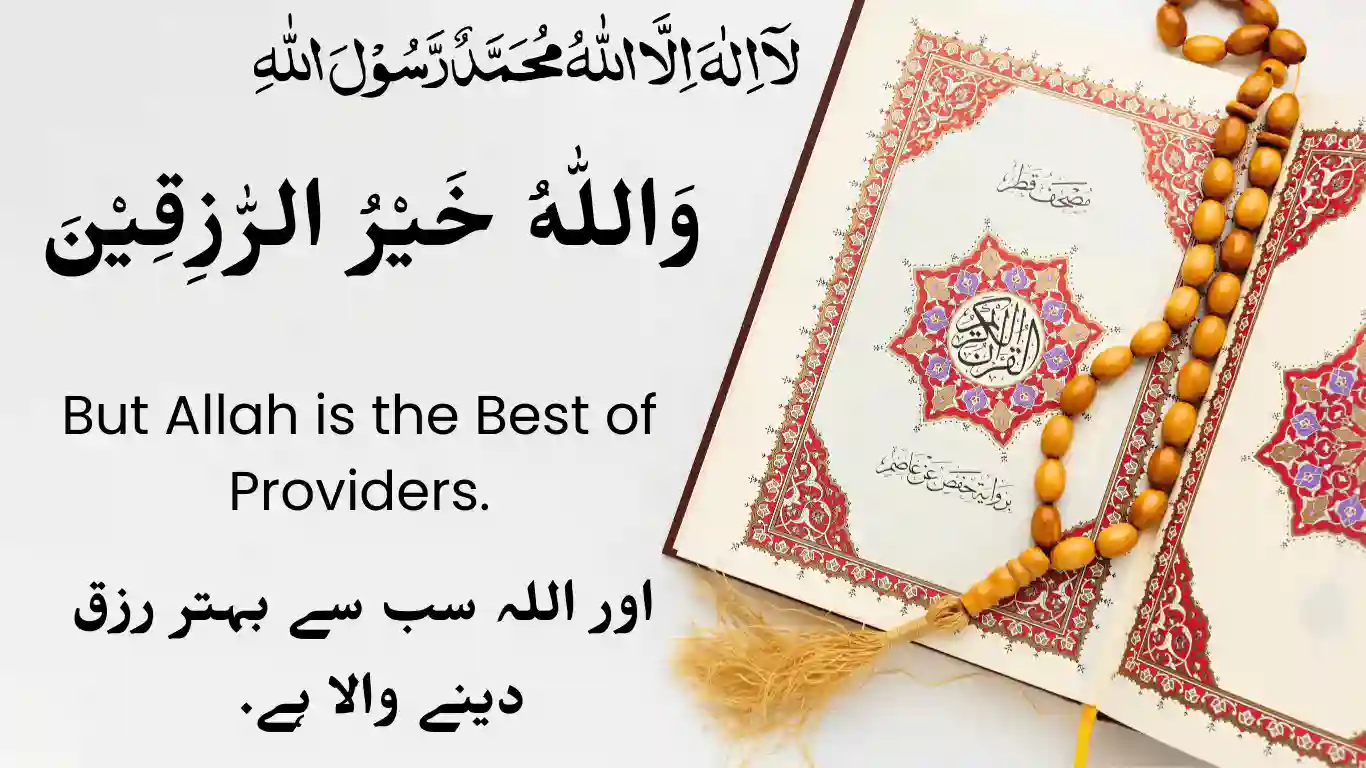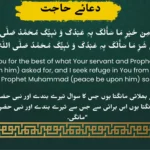The phrase Wallahu Khairur Raziqin is a powerful expression from the Quran, meaning And Allah is the Best of Providers. It reminds us of Allah’s boundless mercy, His provision for all creation, and His unparalleled capability as the ultimate Sustainer. In this article, we will explore its context, meaning, and the verses where it appears, along with their Arabic text, English translation, and Urdu translation.
| Allahu Latifun Bi ibadihi Yarzuqu Man Yasha’u |
| Amar Bil Maroof wa Nahi Anil Munkar Meaning in Urdu |
| حَسْبُنَا اللَّهُ وَنِعْمَ الْوَكِيلُ |
| فَبِأَيِّ آلَاءِ رَبِّكُمَا تُكَذِّبَانَ |
What Does “Wallahu Khairur Raziqin” Mean?
The phrase “Wallahu Khairur Raziqin” comes from the Arabic root رزق (Rizq), meaning sustenance or provision. It reflects Allah’s role as the supreme Provider who fulfills the needs of all living beings. This profound expression occurs in the Quran multiple times to emphasize the dependence of all creation on Allah for sustenance.
Quranic Verses Containing “Wallahu Khairur Raziqin”
1. Surah Al-Jumu’ah (62:11)
Arabic:
وَاللّٰهُ خَيْرُ الرّٰزِقِيْنَ
English Translation:
“But Allah is the Best of Providers.”
Urdu Translation:
“اور اللہ سب سے بہتر رزق دینے والا ہے۔”
This verse underscores the importance of prioritizing Allah’s remembrance over worldly gains. It serves as a reminder that true sustenance comes from Allah alone.
2. Surah Al-Ma’idah (5:114)
Arabic:
وَارْزُقْنَا وَأَنْتَ خَيْرُ الرَّازِقِينَ
English Translation:
“Provide for us, for You are the Best of Providers.”
Urdu Translation:
“ہمیں رزق عطا فرما، بے شک تو بہترین رزق دینے والا ہے۔”
Here, Prophet Isa (AS) prays to Allah, acknowledging Him as the ultimate Provider. This verse emphasizes reliance on Allah for sustenance and blessings.
3. Surah Saba (34:39)
Arabic:
قُلْ إِنَّ رَبِّي يَبْسُطُ الرِّزْقَ لِمَنْ يَشَاءُ وَيَقْدِرُ ۚ وَمَا أَنْفَقْتُمْ مِنْ شَيْءٍ فَهُوَ يُخْلِفُهُ ۖ وَهُوَ خَيْرُ الرَّازِقِينَ
English Translation:
“Say, ‘Indeed, my Lord extends provision for whom He wills and restricts it, and whatever you spend of anything [in His cause], He will replace it. And He is the Best of Providers.'”
Urdu Translation:
“کہہ دو کہ بے شک میرا رب جس کے لیے چاہے رزق کشادہ کرتا ہے اور جس کے لیے چاہے تنگ کرتا ہے۔ اور جو کچھ تم خرچ کرتے ہو، وہ اس کی جگہ عطا کرتا ہے، اور وہ بہترین رزق دینے والا ہے۔”
This verse connects the act of giving in Allah’s cause with the assurance that Allah replenishes and sustains abundantly.
Lessons from “Wallahu Khairur Raziqin”
- Allah’s Supremacy in Sustenance:
Allah alone provides sustenance, reminding us that our efforts must be coupled with faith in His decree. - Contentment with Rizq:
The phrase teaches contentment and trust in Allah’s distribution of provisions. He knows what is best for us. - Encouragement to Give Charity:
Spending in the way of Allah never depletes wealth; rather, it increases blessings. - Strengthening Tawakkul (Reliance):
It encourages reliance on Allah for both material and spiritual needs.
Practical Ways to Reflect “Wallahu Khairur Raziqin” in Life
- Thankfulness:
Show gratitude for every blessing, no matter how small. - Charity:
Share your wealth, knowing Allah will multiply it. - Dua:
Always ask Allah for sustenance and blessings, as He alone controls provisions. - Trust in Allah’s Plan:
Avoid worrying excessively about livelihood. Instead, work hard while trusting Allah’s provision.
FAQs:
It means “And Allah is the Best of Providers.” The phrase highlights that Allah is the ultimate source of all sustenance and provisions.
This phrase appears in several places, including Surah Al-Jumu’ah (62:11), Surah Al-Ma’idah (5:114), and Surah Saba (34:39).
By trusting Allah’s provision, giving in charity, being thankful, and avoiding excessive worry about sustenance.
Conclusion
The phrase “Wallahu Khairur Raziqin” is a powerful reminder of Allah’s role as the ultimate Provider. It inspires reliance, gratitude, and humility while reinforcing the importance of seeking Allah’s blessings in every aspect of life. By internalizing this message, we can lead a life of contentment and unwavering faith.





Woah! I’m really loving the template/theme of this site.
It’s simple, yet effective. A lot of times it’s challenging
to get that “perfect balance” between superb usability and visual appearance.
I must say you have done a amazing job with this.
Additionally, the blog loads super quick for me
on Opera. Outstanding Blog!